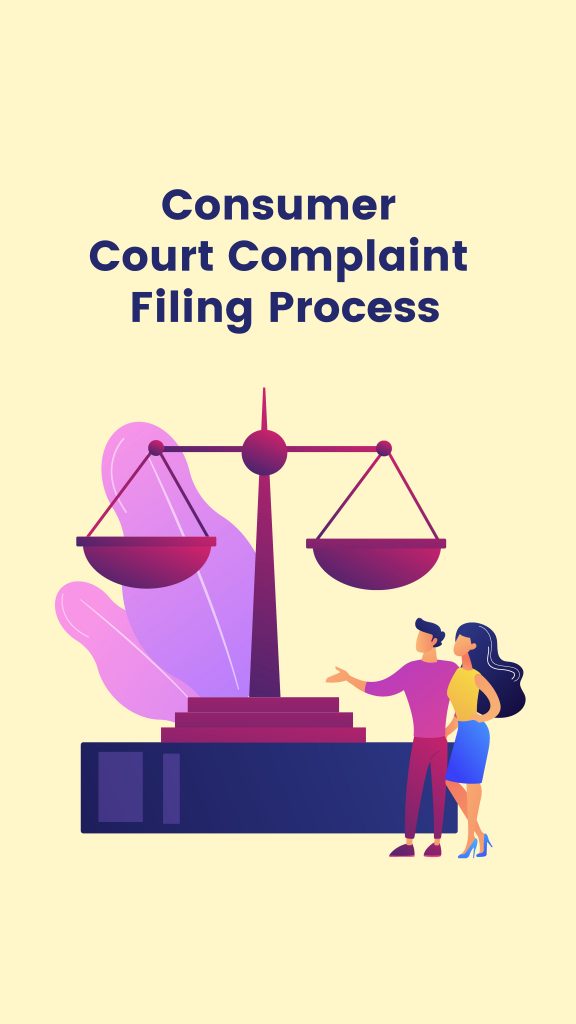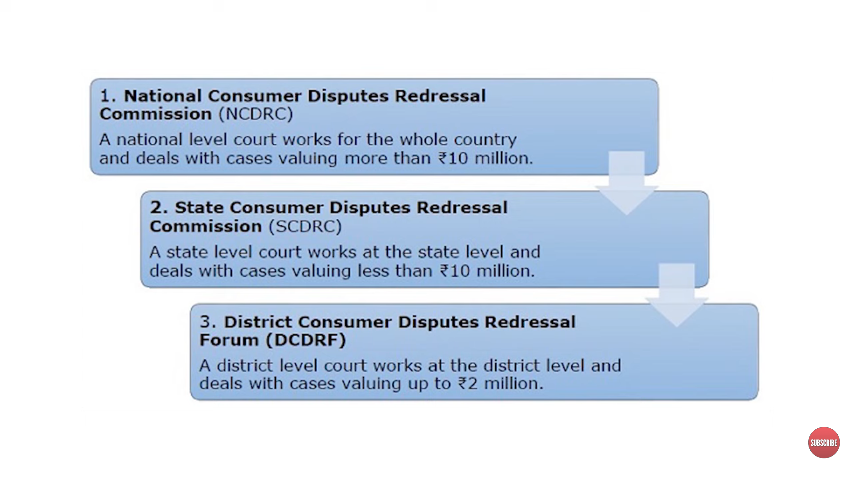Often when purchasing things from stores or e-commerce websites, we find faulty products. As such when the sellers do not cooperate with us and refuse to replace the product or refund the money, we often threaten to take them to the consumer court. But how many of us actually are aware of the entire consumer court complaint filing process? So to make matters simple for you, we sat down with Advocate Naman Mohnot, an alumnus of NLU Delhi and Founder of AapkaConsultant.com. Read on to know the entire process of the Consumer Court Complaint filing process.

Table of Contents
What is the Consumer Protection Act?
During the 1980s when India’s economy started booming and a lot of foreign companies started to come into the Indian market, it was seen that the end consumer was not getting great customer service. The products and services being delivered to the end-user were deficient. Ultimately, there was a need to have a law that would protect the consumer. Thus, the Consumer Protection Act, 1986 came into being. It is still into effect to this day.
What is a Consumer?
Under the Consumer Protection Act, 1986 the Consumer is an individual who buys a product or gets service for consideration. It may be for his or her personal usage or to earn his living for survival. The consideration may be in the forms of paid, partly paid, and partly promised. The consumer guarantees 6 consumer rights under the Consumer Protection Act:
- Right to safety
- Inform to right
- Right to choose
- Hear to right
- Redressal to right
- Right to consumer education
But the Consumer needs to be the end-user. It cannot be a person buying a product/service for commercial purposes. Also, any free service is not covered under this Act.
Who can one sue under the Consumer Court?
As per the law, it is advisable to sue both the manufacturer and the reseller of the product. For instance, if you buy a Samsung washing machine from Amazon and it turns out to be defective then you will sue both Samsung and Amazon for it.
Who will compensate for the Consumer Court complaint?
Generally, the consumer court only decides who or how much will the manufacturer and reseller compensate the consumer.

What is the process for Consumer Court complaint filing?
- Firstly, one needs to know the scenarios where filing a consumer court complaint is plausible. If one buys some products and there is a defect in it such as the quantity received is less, or the quality is bad, then one can file a complaint. Similarly, for services the quality of service received depends on the standard of the place. So visiting a swimming pool at a luxury hotel and at a local club will have different quality measures.
- It is also advisable to send the party a legal notice before filing a complaint at the consumer court. The reason being, upon receiving the legal notice the company might solve your issues with their service then and there. And the situation might not escalate to going to a consumer court. One does not need a lawyer to send a legal notice as well. They can just send a simple letter via post, to have a formal record of it. You can access this link to fill out the form and download a legal notice format.
Who can file a complaint at the consumer court and within what duration?
If A buys the goods but gives it to B for usage, then B has the right to file the complaint as well. Ultimately, the beneficiary or the end-user of the product or service can file the complaint. For example, in the
There is also a limitation period of 2 years from the cause of action, to file a complaint. Cause of action means the day since the product showed a defect or the service showed a deficiency. But even if one is not able to file a complaint within the limitation period, the consumer courts and forums are quite liberal in nature and accept the complaint anyway.
What is the Consumer Court structure?
There is a different setup for consumer courts known as the Consumer Redressal Forum. Every district has a District Consumer Disputes Redressal Forum (DCDRF). Each state has a State Consumer Disputes Redressal Commission (SCDRC). Additionally, there is a National Consumer Disputes Redressal Commission (NCDRC) at the national level. The jurisdiction for each depends on the claim of the consumer. If the claim is under Rs 20 lakh then the consumer goes to the DCDRF. If the claim ranges from Rs 20 lakh to Rs 1 crore, then the consumer goes to the SCDRC. For claims above Rs 1 crore, the

It is also possible to file the complaint at a court location at either the location of the cause of action or the location of the company headquarters.
What are the requirements for Consumer Court complaint filing?
- The fee for filing a complaint at the consumer court is minimal. For claims up to Rs 1 lakh, the fee is Rs 100. For claims up to Rs 5 lakh, the claim is Rs 200, and so on.
- No lawyer is necessary to file a consumer court complaint. An aggrieved consumer can file the complaint himself.
- To file a complaint, the consumer needs to draw up a petition. This petition needs to have the consumer’s name, age, address, and description of the company being sued. Thus, all details of both parties involved need to be given. Then, all the facts of the product defect or the service deficiency need to be given. The full story from when the product/service was ordered to the receiving date, to the cause of action date, and so forth.
- The consumer needs to mention the reason for which he is filing the complaint, i.e., what went wrong with the product or service. A Clause of jurisdiction and a Prayer need to be written, which are most important. The court also pays attention to the mental compensation in such cases and the legal fees are also covered in the compensation.
Some major Consumer Court cases:
- The Supreme Court and Consumer Court Apex Body have passed a law stating that coaching institutes and schools need to refund the extra fee charged to the
consumer if the consumer does not complete the full course period. In the case of Sehgal School of Competition Vs Dalbir Singh, the school refused to refund Dalbir Singh’s extra fees paid for 2 years, when he left the school after 6 months. The school was ordered to refund the extra fees in this case. - In the case of medical negligence, the consumer court provides heavy compensations. In a recent medical negligence case at a big hospital in Chennai, the court-ordered compensation for Rs 25 lakh, to the aggrieved consumer.
- For issues arising with bank transactions, there is compensation given as well. Such as in the case of Dipika Pallikal, who got Rs 5 lakh is compensation from Axis Bank for technical error in a bank transaction.
- E-commerce sites also have consumer complaint redressal systems of their own now.
What is the general duration of a consumer court case?
It is difficult to give an exact timeline but generally with 1-2 years of a consumer court complaint, a settlement, and compensation with interest is received. So even if the compensation comes after 2 years, it will have an interest of 2 years. The cases filed should be genuine though. For frivolous cases, it is seen that the consumer ends up being sued and has to pay compensation to the company in return.
If you are not satisfied with the result of your case then you can go to the higher consumer court within 30 days. Ultimately, you can go to the Supreme Court as well.
Watch our interview with Advocate Naman Mohnot below.
New Consumer Protection Act, 2019
The RTI Act 2019 and the Consumer Protection Act 1986 play a major role in the well-being and protection of consumer rights. As we previously saw in the Bata case where a customer was forced to pay Rs 3 for a branded carry bag for which he protested and ended up getting Rs 3000 in a penalty from the brand. This was all due to his complaint in the Consumer Court. But now the Consumer Protection Act has undergone a revision and the new and improved Consumer Protection Act 2019 was enacted on 9th August 2019. This came into enforcement from 20th July 2020 onwards. So we sat down with Advocate Naman Mohnot and discussed ten changes to the Consumer Protection Act, 2019.
10 Changes to the Consumer Protection Act, 2019
The Consumer Protection Act has been completely revised to provide even bigger and better benefits to the end consumer. These major revisions are as follows:
1. E-commerce transactions
E-commerce platforms such as Amazon, Flipkart, PayTM, Myntra, etc. enjoy a great market share in today’s time and have a huge customer base. Earlier, e-commerce platforms were excluded from Consumer Protection Act. But in a revolutionary decision, e-commerce platforms have been included in the Consumer Protection Act for the first time ever in the country.
All e-commerce platforms are now also obligated to reveal their policies regarding refunds, returns, complaint registration, etc. They also need to solve and close every complaint within a time frame of a month. The exponential growth in the usage of e-commerce platforms has led the government to take such a decision.
2. Misleading advertisements and endorsements by celebrities
Previously, if a product or service was endorsed by a celebrity and upon using it the claims did not stand true then you could not point your finger at the celebrity. But now, celebrities endorsing any brand are also liable to the claims being made. So it is now possible to file a Consumer Complaint about false/misleading advertising not only against the brand but also the face endorsing it.
This rule also extends to YouTubers giving product reviews or spreading any information on their YouTube videos. If a consumer finds their information wrong then a consumer complaint can be filed against them too.
3. Telecom and food sector
The definition of the consumer has been expanded to include the Telecom and Food sectors. With the onslaught of technology, every person has access to a smartphone. These phones need telecom to function. Often consumers faced the issue of network or mobile internet connectivity. So the Telecom sector has been included in the Act as they provide a service and are liable for issues in their service.
Additionally, food sector brands such as Swiggy and Zomato have been included in the Act. Since these brands provide an essential service and have a big consumer base, their consumer rights will now be protected under the Act.
4. Manufacturer’s liability
Previously, only the seller of the product was liable for any malfunction of the product. Hence, the consumer complaint would only be filed against the seller. But now the manufacturer can also be held responsible for the product and can be named in the consumer complaint too.
5. Aggregator’s liability
Any aggregator which serves as a platform for different brands to come upon and sell their products is also now liable to consumer complaints. Platforms such as Amazon and Flipkart which were not the manufacturers of the product but only provide a platform for selling are now liable for any damaged or misleading product sold on their platforms. Hence, they can also be penalized under the new Consumer Protection Act, 2019.
6. Place of filing consumer complaint
The earlier Act had the provision of filing consumer complaints at the location of the defendant’s office or the location of the arising of the consumer issues. This would be a nuisance for the consumer to travel to the location of the headquarters of a company to file a consumer complaint against them. But the biggest change in the Consumer Protection Act, 2019 comes in the form that the consumer can now file a complaint in the city where he resides itself. This move will definitely make it much easier for consumers to file complaints.
7. E-Filing of complaints
With the option of filing your consumer complaint completely digitally the trouble of visiting an advocate or paying legal fees to lawyers no longer arises. The entire consumer complaint can now be filed online, making it again easier for the consumers to raise their concerns.
8. Pecuniary jurisdiction
Previously, the consumer complaint claim amount of up to Rs 20 lakh fell under the District, between Rs 20 lakh to Rs 1 crore fell under the State, and above Rs 1 crore fell under the National jurisdiction consumer forum. But with the revision of the Act, now claims up to Rs 1 crore fall under the District, between Rs 1 crore to Rs 10 crore fall under the State, and above Rs 10 crore fall under the National jurisdiction consumer forum.

9. 50% Compensation submission before higher appeal
It is usually seen that once a lower consumer court releases its decision, which is generally in terms of the consumer, the defendant takes the case to a higher court. This leads the consumer to again fight the case at the higher court with no monetary respite. Hence, it is now decided that once a lower consumer court has given a decision then the defending company has to pay 50% of the compensation decided to the court before moving the case to a higher consumer court. The court may disburse this 50% compensation to the consumer is it seems fit. This will lower help in getting some respite to the consumer and lessen the number of appeals too.
10. Complaint against PF, ESI?
If you are contributing towards your PF and ESI schemes and feel their office bodies not replying to your claims or otherwise, then you can file a consumer complaint against them too. Even if these are government bodies the Supreme Court has given the decision to file consumer complaints against them for any wrongdoing at a consumer court.
Watch our detailed video with Advocate Naman Mohnot below.
Join the LLA telegram group for frequent updates and documents.
Download the telegram group and search ‘Labour Law Advisor’ or follow the link – t.me/JoinLLA
It’s FREE!


